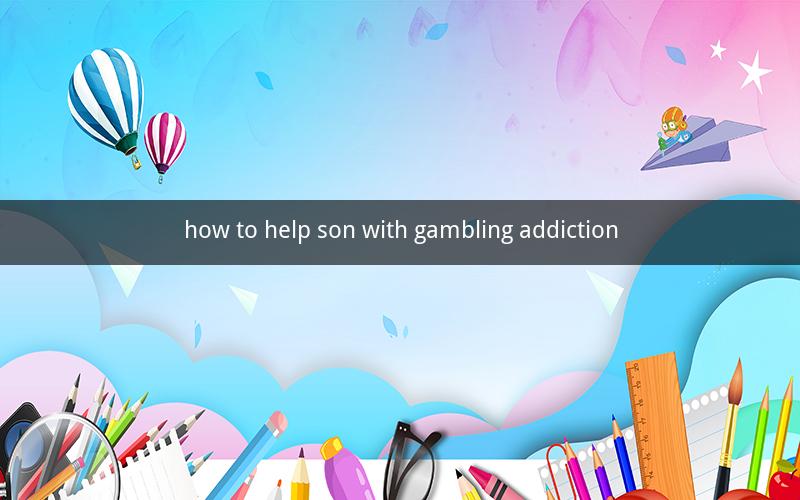
Contents
1. Understanding the Problem
2. Open Communication
3. Professional Help
4. Support Systems
5. Financial Management
6. Education and Awareness
7. Setting Boundaries
8. Encouraging Alternative Activities
9. Patience and Understanding
10. Legal and Ethical Considerations
---
1. Understanding the Problem
The first step in helping your son overcome his gambling addiction is to fully understand the nature of the problem. Gambling addiction is a complex issue that often involves psychological, emotional, and sometimes even physical components. It is crucial to recognize that gambling addiction is a disease and not a lack of willpower. This realization can help in approaching the situation with empathy and support.
1. Open Communication
Communication is key in addressing any addiction. Encourage open and honest dialogue with your son about his struggles. Create a safe and non-judgmental space where he feels comfortable sharing his thoughts and feelings. This can help in understanding the underlying causes of his addiction and in developing a support plan.
1. Professional Help
Seeking professional help is essential. Therapists, counselors, and addiction specialists can provide your son with the tools and strategies needed to overcome his addiction. Therapy may include individual sessions, group therapy, or family counseling. It is important to find a professional who specializes in gambling addiction to ensure the most effective treatment.
1. Support Systems
Building a support system is crucial for your son's recovery. This can include family members, friends, or support groups specifically for individuals with gambling addiction. Having a network of people who understand and support his journey can provide encouragement and guidance throughout the process.
1. Financial Management
Gambling addiction often leads to significant financial problems. It is important to address these issues head-on. This may involve setting up a budget, seeking financial counseling, or even taking legal steps to protect your son's assets. Managing finances responsibly can help prevent relapse and provide a sense of control over his life.
1. Education and Awareness
Educating yourself and your son about gambling addiction can be incredibly beneficial. Understanding the risks, triggers, and consequences of gambling can help both of you develop strategies to avoid relapse. This can also involve exploring alternative hobbies and interests that do not involve gambling.
1. Setting Boundaries
Establishing clear boundaries is crucial in helping your son manage his addiction. This may include setting limits on his access to gambling activities, monitoring his spending, or even temporarily restricting his access to certain areas or websites. Boundaries can provide structure and prevent opportunities for relapse.
1. Encouraging Alternative Activities
Encouraging your son to engage in healthy, non-gambling activities can be a powerful tool in his recovery. Activities such as sports, hobbies, or social events can provide a sense of fulfillment and distract him from the urge to gamble. It is important to find activities that he enjoys and that can become a part of his daily routine.
1. Patience and Understanding
Recovery from gambling addiction is a long and challenging process. It is important to be patient and understanding throughout this journey. Your support and encouragement can make a significant difference in his ability to overcome his addiction.
1. Legal and Ethical Considerations
In some cases, legal and ethical considerations may arise. This could involve reporting financial fraud or seeking legal advice on how to handle the consequences of your son's gambling. It is important to consult with professionals who can provide guidance on these matters.
---
10 Questions and Answers
1. Q: How can I tell if my son has a gambling addiction?
A: Look for signs such as secretive behavior, financial problems, mood swings, and neglect of responsibilities.
2. Q: Should I confront my son about his addiction?
A: Yes, but approach the conversation with empathy and understanding. It's important to be non-judgmental and open to listening to his perspective.
3. Q: Can therapy help my son overcome his addiction?
A: Absolutely. Therapy can provide your son with coping strategies and support throughout his recovery journey.
4. Q: How can I support my son without enabling his addiction?
A: Set boundaries, provide encouragement, and be a source of strength. Avoid making financial or other concessions that could lead to relapse.
5. Q: What should I do if my son is in debt due to gambling?
A: Seek financial counseling and consider legal advice to address the debt responsibly and protect your son's assets.
6. Q: Are there support groups for family members of someone with a gambling addiction?
A: Yes, there are various support groups, such as Gam-Anon, that offer support and guidance for family members.
7. Q: How can I help my son find alternative activities to gambling?
A: Encourage him to try new hobbies, join clubs, or engage in social activities that can provide a sense of fulfillment and community.
8. Q: What if my son refuses to seek help for his addiction?
A: Continue to offer support and encourage him to seek help. In some cases, it may be necessary to involve professionals or legal authorities.
9. Q: How long does it take to recover from a gambling addiction?
A: Recovery can vary greatly from person to person. Some may experience immediate progress, while others may require ongoing support and treatment.
10. Q: What can I do to help my son maintain his recovery?
A: Continue to provide support, monitor his progress, and encourage him to participate in ongoing therapy and support groups.